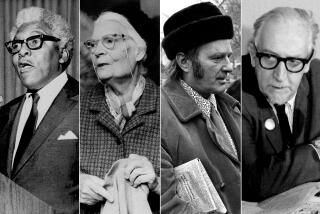Edward Keating, 77; Founder of Ramparts
- Share via
Edward Keating, an activist who founded Ramparts magazine in the 1960s and watched it grow from a tiny Catholic-oriented publication to become the leading magazine of the American left, has died. He was 77.
Keating, who became a West Coast leader of the anti-Vietnam War movement, died April 2 at Stanford University Medical Center near Palo Alto after battling pneumonia. He lived in Mountain View.
A lawyer-turned-businessman who converted to Roman Catholicism in his late 20s, Keating launched Ramparts in 1962 in Menlo Park as a quarterly literary forum for Catholic intellectuals.
It soon evolved into something more.
“He started getting stories by black priests who were talking about civil rights,” said Keating’s son Mike. “It sort of naturally morphed into getting more and more interesting articles about the civil rights movement and taking a strong moral stance on that.”
In time, he said, Ramparts “became completely secular and very committed to the civil rights movement and the antiwar movement.”
Ramparts’ influence was significant and its pages served as an outlet for the kinds of stories that were not being published elsewhere.
Ramparts printed early articles about the murders of three civil rights workers in Mississippi, for example, and it exposed the Central Intelligence Agency’s secret financing of the National Students Assn.
An issue of Ramparts that featured dozens of pictures of wounded Vietnamese children also prompted the Rev. Martin Luther King Jr. to publicly come out against the war for the first time, said Clayborne Carson, director of the Martin Luther King Jr. Papers Project at Stanford.
“Ramparts was one of the most significant publications expressing the viewpoints of the New Left,” said Carson, who had known Keating since the 1960s. “While it only had a short history, it had a major impact in terms of shaping opinions about civil rights and antiwar issues.”
Ramparts attracted writers such as Susan Sontag, Seymour Hersh, Robert Scheer (who later became the magazine’s editor) and John Howard Griffin, author of the best-selling 1961 book “Black Like Me,” who became a close family friend.
Impressed with poetry written by imprisoned Black Panther Eldridge Cleaver, Keating gave him a job as a writer at the magazine when he got out of prison; Cleaver acknowledged Keating in the dedication of his 1968 book “Soul on Ice” as “the first professional to pay any attention to my writing.”
“He was one of those rare guys who put all his money and all his energy in things he believed in,” said Dugald Stermer, Ramparts’ art director from 1964 through 1970.
“I think he found himself in the eye of a hurricane,” Stermer said. “After starting as a kind of anticlerical left-wing magazine, it became a national force. I don’t think any of us had that in mind when we started out.”
Steve Keating described his father as “a champion of the underdog or the dispossessed. He just had a strong sense of conscience, and he just felt fired up to jump into the fray.”
Keating wrote “The Scandal of Silence,” a 1965 book about the Catholic Church and its silence over the Holocaust during World War II. About the same time, he became an agnostic and left the church.
In 1967, Keating unsuccessfully ran for Congress on a peace platform against Republican Shirley Temple Black and four other Democrat and Republican candidates vying for the vacated 11th Congressional District seat in San Mateo. (Republican Paul N. “Pete” McCloskey Jr. won the race.)
Keating served as chairman of the West Coast Committee to End the War in Vietnam, which drew more than 60,000 participants for a 1967 march on Market Street in San Francisco and a rally in Kezar Stadium.
And Keating was part of the legal defense team for Black Panther leader Huey Newton, which Keating wrote about in his 1971 book “The True Story of the Trial of Huey P. Newton for Murder.”
Last month, Keating donated recordings he made in the 1960s with Black Panther leaders to Stanford University, which houses the Black Panthers’ papers.
In 1967, after new investors had taken control of Ramparts’ board of directors, the board fired Keating as president and publisher.
“They threw me out like an old shoe,” he said later.
Ramparts, which at its peak had a circulation of nearly 400,000, continued to operate until 1975.
The son of an industrialist, Keating was born in New York City in 1925. In 1940, his family moved to California and he entered a prep school in Menlo Park.
Keating served three years in the Navy in the Pacific, then resumed his studies at Stanford and graduated from its law school in 1950.
After practicing law for four years, Keating went into business, including buying commercial real estate.
Raised as what he once described as a nominal Protestant, he became a Catholic in 1954. Keating, who taught English at the University of Santa Clara in 1959, once said he launched Ramparts because the era lacked a decent platform for Catholic intellectuals and writers.
After leaving Ramparts in 1967, Keating continued to write, including short stories, novellas and “Broken Bough,” a 1975 book about human nature.
In addition to Mike and Steve Keating, he is survived by four other children -- Karen Keating McCann of Chagrin Falls, Ohio; Melissa Keating Masland of Lafayette, Calif.; Kate Keating Bowles of San Anselmo, Calif., and John Keating of Salem, Ore. -- and six grandchildren.
More to Read
The biggest entertainment stories
Get our big stories about Hollywood, film, television, music, arts, culture and more right in your inbox as soon as they publish.
You may occasionally receive promotional content from the Los Angeles Times.










